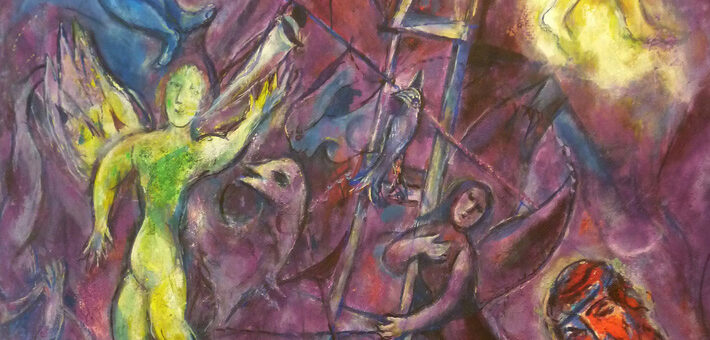Commentary on Matthew 13:24-30, 36-43
The tagline for the credit card company Capital One asks: “What’s in your wallet?”
The implication is that their credit card should be there. What we carry in our physical wallets can tell a lot about who we are as a person. Where you live, where/how you spend your money, organizations to which you belong can all be determined by what is in your wallet. Similarly, in the parable of the weeds, it seems that Jesus is asking the crowd — What’s in your spiritual wallet? There is a choice to be made and Jesus’ teaching in this chapter is intended to serve as an advertisement for the kingdom of God.
The parable of weeds is the second parable in Jesus’ third teaching unit in the Gospel of Matthew.
As with the parable before and those that follow, Jesus employs this genre to teach his followers about the kingdom (basilea) of heaven. The kingdom of God is, in fact, the main focus of Jesus’ teaching. Basilea can be translated as kingdom, reign, or rule. However, reference to the kingdom of heaven is unique to the Gospel of Matthew. Many scholars suggest the difference is semantic or a word choice by the gospel writer and essentially the terms mean the same thing. However, given that the writer of Matthew uses the kingdom of God, the kingdom of heaven, and simply the kingdom, the writer seems to use the terms to function in different ways (though this does not mean that the fundamental meaning differs).
In this gospel, the kingdom of heaven delineates differences between the realm of God’s kingdom and the kingdom of Roman emperor. As the people in the first century Mediterranean would have experienced it, the emperor’s kingdom is on earth. The kingdom of heaven is where God reigns. The act of Jesus coming into the earth represents the in breaking of the God’s kingdom on the earth. This makes explicit that the gospel, is indeed, a political document. The writer is proposing an alternative understanding of the world, one that would directly oppose the political leaders of his time. As such, clear lines needed to be drawn. Which kingdom will prevail? Whose empire will you participate in?
New Testament scholar Warren Carter suggests that the “divisive impact of God’s empire is central to chapter 13.”1 It is divisive in the sense that one must choose their allegiance — to God or to the emperor. This is attested most clearly in the parable of the weeds. Jesus begins this exposition by telling the crowd: “The kingdom of heaven may be compared to someone who sowed good seed in his field; but while everyone was asleep, an enemy came and sowed weeds among the wheat, and then went away” (Matthew 13:24). Immediately, the crowd is alerted to the fact that there is opposition to the kingdom of heaven; there is an enemy who seeks to do harm.
Yet, the establishment of dichotomies is dangerous and has material implications. Dichotomies such as “us versus them” or “body or soul” or “savage versus civilized” or “good versus evil” are examples of the ways in which we attempt to distill our world into two realms. When we reduce our worldview to such sharp contrasts, we often lose the ability to see our collective best interests and common goals. It seems we are witnessing this in our current political environment where similar lines have been drawn — “Republican or Democrat” or “liberals versus conservatives.” Such distinctions often overshadow the shared desire to identify the common good of all citizens and most often result in conflict that can easily escalate into violence.
The solution to the tendency to divide our world into two is found in this parable. Jesus teaches: “Let both of them grow together until the harvest; and at harvest time I will tell the reapers, collect the weeds first and bind them in bundles to be burned, but gather the wheat into my barn” (Matthew 13:30). The owner of the field understands that once they are together, the weeds and wheat must grow together since the destruction of one can lead to the demise of the other. Likewise, our tendency to split our world into two — “believer or nonbeliever” or “sinners or saints” — is not useful. We are in this world together, whether this world is the planet, our country, our community, or our congregations, we must grow together and allow the Great Judge, God, to do the separating in God’s own time. We should acknowledge that likewise we need each other to survive.
The parable also elucidates the diversity that can be found in the kingdom of heaven. This field owner has slaves who report to him. He is not a poor peasant farmer; he is a man who owns property and unfortunately, people. It is his slaves who report to him that there are weeds growing in his field and they ask if they should remove the weeds. The parable does not address this power dynamic, though it is important to acknowledge it. Just as we should not split our world into two, we should be careful not to replicate the hierarchical and oppressive system from the kingdom of earth into the kingdom of heaven.
As with the first parable in this teaching unit, Jesus provides further explanation to his disciples. However, this time, he is prompted by them asking him to explain the parable. He tells the disciples: “The one who sows the good seed is the Son of Man; the field is the world, and the good seed are the children of the kingdom; the weeds are the children of the evil one, and the enemy who sowed them is the devil; the harvest is the end of the age, and the reapers are angels” (Matthew 13:38-39). Given this explanation, the harvest belongs to the Son of Man. We are the fruit of Christ’s labor. The angels “collect out of his kingdom all causes of sin and all evildoers, and they will throw them into the furnace of fire, where there will be weeping and gnashing of teeth (13:41-42).” It is important to recognize that actions have consequences. If one sows hatred and discord that is what one will reap.
In Romans 14:17, Paul describes God’s kingdom as righteousness, peace, and joy. In order for us to see a world that can be characterized as such, we must acknowledge that the causes of sin are not simply our personal struggles, but more so our societal ills. For instance, the causes of poverty — war, greed, selfishness, etc. — are sin. It is not for us to judge one another or to separate ourselves from each other. If our spiritual wallet is to contain a license issued by the kingdom of God, we must live peaceably and compassionately with all, recognizing that we (the good and the evil) are necessary for each other’s survival.
Notes:
1. Warren Carter, Matthew and the Margins: A Socio-Political and Religious Reading (London and New York: T&T Clark, 2000), 280.


July 23, 2017